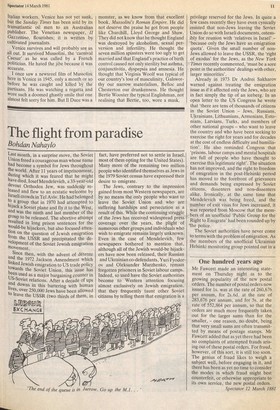The flight from paradise
Bohdan Nahaylo
Last month, in a surprise move, the Soviet Union freed a courageous man whose name had become a symbol for Jews throughout the world. After 11 years of imprisonment, during which it was feared that he might have died, Iosef Mendelevich, a 33-year-old devout Orthodox Jew, was suddenly released and flew to an ecstatic welcome by Israeli crowds in Tel Aviv. He had belonged to .. a group that in 1970 had attempted to hijacks Soviet plane and fly it to the West, and was the ninth and last member of the group to be released. The abortive attempt resulted in long prison sentences for the would-be hijackers, but also focused attention on the question of Jewish emigration from the USSR and precipitated the development of the Soviet Jewish emigration movement.
Since then, with the advent of détente and the 1972 Jackson Amendment which linked Jewish emigration to US trade policy towards the Soviet Union, this issue has been used as a major bargaining counter in US-Soviet relations. After a decade of ups and downs in this bartering with human lives, over 250,000 Jews have been allowed to leave the USSR (two thirds of them, in 112 eM E)C HAN fact, have preferred not to settle in Israel, most of them opting for the United States). Many more of the remaining two million people who identified themselves as Jews in the 1979 SOviet census have expressed their desire to emigrate.
The Jews, contrary to the impression gained from most Western newspapers, are by no means the only people who want to leave the Soviet Union and who are suffering hardships and persecution as a result of this. While the continuing struggle of the Jews has received widespread press coverage over the years, the plight of numerous other groups and individuals who wish to emigrate remains largely unknown. Even in the case of Mendelevich, few newspapers bothered to mention that, although all of the Jewish would-be hijackers have now been released, their Russian and Ukrainian co-defendants, Yuri Fyodorov and Oleksander Murzhenko, remain forgotten prisoners in Soviet labour camps. Indeed, so used have the Soviet authorities become to Western attention focusing almost exclusively on Jewish emigration, that they frequently taunt other Soviet citizens by telling them that emigration is a privilege reserved for the Jews. In quite a few cases recently they have even cynically insisted that non-Jews leaving the Soviet Union do so with Israeli documents, ostensibly for reunion with 'relatives in Israel' — 'because only the Jews have an emigration quota'. Given the small number of nonJews allowed to leave the USSR, the 'right of exodus' for the Jews, as the New York Times recently commented, 'must be a sore point in the authorities' dealings with other, larger minorities'.
Already in 1973 Dr Andrei Sakharov warned against treating the emigration issue as if it affected only the Jews, who are in fact simply the tip of an iceberg. In an open letter to the US Congress he wrote that 'there are tens of thousands of citizens in the Soviet Union — Jews, Russians, Ukrainians, Lithuanians, Armenians, Estonians, Latvians, Turks, and members of other national groups — who want to leave the country and who have been seeking to exercise the right for years and for decades at the cost of endless difficulty and humiliation'. He also reminded Congress that 'prisons, labour camps and mental hospitals are full of people who have thought to exercise this legitimate right'. The situation has not improved, and the right to freedom of emigration in the post-Helsinki period has moved to the forefront of grievances and demands being expressed by Soviet citizens, dissenters and non-dissenters alike. Ironically, at the same time that Mendelevich was being freed, and the number of exit visas for Jews increased, it was reported from Moscow that the members of an unofficial 'Public Group for the Right to Emigrate' had been rounded up by the police.
The Soviet authorities have never come to terms with the problem of emigration. As the members of the unofficial Ukrainian Helsinki monitoring group pointed out in a document addressed to the 1977 Belgrade review conference, `no one flees from paradise. People leave from where things are bad'. Emigration until 'quite recently was defined in Soviet dictionaries of foreign words as 'a mass migration from one country to another, brought on by various reasons (economic, political, religious and others); an unavoidable companion of an exploitative society'. Small wonder, then, that the authorities have been so reluctant to honour their legally binding commitment to guarantee the right of everyone to 'leave any country, including his own'. In practice, they have treated emigration as a privilege to be bestowed on a chosen few, a punishment to be used against troublesome nonconformists enjoying support outside the country, and as a lever in bargaining with the West. Since the late 1970s, new regulations have limited emigration to individuals with 'first degree relatives' living abroad, thereby reinforcing the principle that emigration is not an automatic legal right of all Soviet citizens, but a measure designed solely for the purpose of family reunification.
The arbitrary manner in which this principle is applied can be seen from the recent change in official attitudes towards Armenian emigration. Last year, without, any explanation, Armenians were allowed to leave in record numbers of up to 1,000 a month. Most of those who have departed are from families that went to the USSR after the second world war, and who have relatives in the United States., Lebanon, , Canada and France. Around 40,000 more Armenians are believed to want to follow. Meanwhile, there is not even a trickle of Lithuanian, Estonian, Latvian or Ukrainian emigrants from the western regions of the USSR which were not incorporated into the Soviet Union until after the 1939 Ribbentrop-Molotov Pact. Emigration remains virtually impossible for members of these groups, although many of them have relatives abroad. While the situation for Russians is far from good, it is certainly a lot better. According to a report in Newsweek (8 December 1980), since 1970 some 36,000 Russians have emigrated to the United States alone, and 'virtually a whole generation of Russian intellectuals has been transplanted to the West'.
After the Jews, the most vigorous campaign for emigration has been conducted over the last decade by members of the USSR's two-million-strong German minority. Although many of the movement's activists have been subjected to harassment by the authorities or imprisoned, over 60,000 Soviet Germans have been allowed to leave for West Germany. Another small group that despairs of its future as a national minority in the Soviet Union is the Meskhe tians, one of several nationalities deported en bloc from their homeland by Stalin during the second world war. A considerable number of this Turkicised people, which has still not been allowed to return to its homeland in south-west Georgia, are seeking emigration to Turkey as a solution to their problem. Many religious believers are also turning to emigration because of the stringent restrictions imposed by the state on their right to freedom of worship. Over 30,000 Pentecostalists and Baptists have applied to leave, though in the vast majority of cases, unsuccessfully. In 1978 seven Pentecostalists rushed past Soviet guards into the US embassy in Moscow and have been living there ever since.
Already in recent years, a number of Soviet workers, most notably Leonid Siry from Odessa, have campaigned for the right to emigrate on the grounds that economic conditions are unbearable for the poorer sections of the working class. Considering the latest official gloomy forecasts for the Soviet economy, the number of discontented Soviet workers seeking to emigrate can be expected to grow, thus causing the Soviet authorities acute embarrassment. After all, disaffected national and religious groups are one thing, but if workers start asking to leave, the very reason for the Soviet state's existence is brought into question.







































 Previous page
Previous page